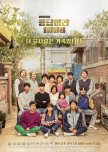

Okay, this might seem like the weirdest and inept recommendation you have ever seen. But let me explain:
While I was watching Reply 1988, I would be repeatedly reminded of Nirvana in Fire. At first glance, these two dramas have nothing in common. One is a Korean drama set in 1988 about family and friendship in a tiny social universe. The other is a historical, highly strategic drama set in China at the emperor's court.
However, they are similar in more subtle matters:
Both plots work only because of the tight networks they are set in, in one it is a neighbourhood street, in the other the aristocratic court. What in Reply 1988 is build on social ties, is build upon a political net in NiF.
Then there is the universal and well-rounded plot that involves most humane emotions and ambitions on which the story is build on. This is what makes them similar: There are no big "events" or accidents or villains out-of-the-blue that lead the story, but the people's emotions, ambitions and motifs ARE the story.
Both do not emphasize on the romance, although it is there. And both are written, shot and acted superbly.
You know, it is kind of comparing an absolutely fantastic cheese to an absolutely fantastic cheese-cake. They seem nothing alike, but when you look closer, or taste deliberately, you will "feel" that both were made from the same kind of milk. :)
While I was watching Reply 1988, I would be repeatedly reminded of Nirvana in Fire. At first glance, these two dramas have nothing in common. One is a Korean drama set in 1988 about family and friendship in a tiny social universe. The other is a historical, highly strategic drama set in China at the emperor's court.
However, they are similar in more subtle matters:
Both plots work only because of the tight networks they are set in, in one it is a neighbourhood street, in the other the aristocratic court. What in Reply 1988 is build on social ties, is build upon a political net in NiF.
Then there is the universal and well-rounded plot that involves most humane emotions and ambitions on which the story is build on. This is what makes them similar: There are no big "events" or accidents or villains out-of-the-blue that lead the story, but the people's emotions, ambitions and motifs ARE the story.
Both do not emphasize on the romance, although it is there. And both are written, shot and acted superbly.
You know, it is kind of comparing an absolutely fantastic cheese to an absolutely fantastic cheese-cake. They seem nothing alike, but when you look closer, or taste deliberately, you will "feel" that both were made from the same kind of milk. :)
























